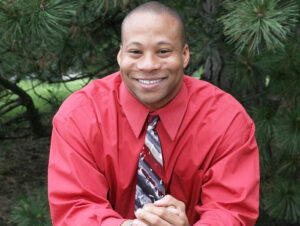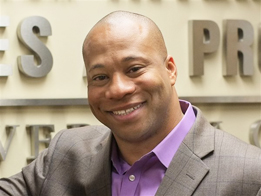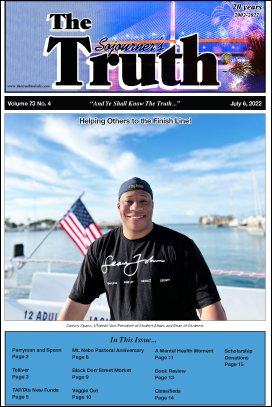
By Rev. Donald L. Perryman, Ph.D.
The Truth Contributor
Life’s most persistent and urgent question is, ‘What are you doing for others?’
– Rev. Dr. Martin Luther King, Jr.
Sammy Spann, Ph.D., was elevated to Vice President and Dean of Students at the University of Toledo on July 1. The laudable promotion comes after 20 years of transformational leadership roles where he advocated for and created change in the lives of UT students.
Structural barriers to racial equity in higher education contribute to lower graduation rates for African American students than their White counterparts. In addition, the number of faculty of color and university administrators at predominately white institutions (PWI) like UT is sparse. The reduced opportunities for cross-racial interaction decrease Black students’ sense of belonging, contributing to a negative impact on recruitment and retention.
In his new role, Spann will need to use his demonstrated skills to help students facing social, economic, and institutional hurdles and headwinds to cross the finish line to graduation.
I spoke with Spann about his university-wide and unit-level plans to address systemic barriers that prevent Black students from accessing and completing college.
Here is our conversation:
 Perryman: Please tell our readers a bit about your history.
Perryman: Please tell our readers a bit about your history.
Spann: I am originally from Atlanta. I attended high school in Macon, Georgia, but my family lives in Atlanta and Tuskegee, Alabama. That area produced music icons like Otis Redding, Little Richard and James Brown. So, I came up here from Fort Valley State University, where I went to undergrad.
Perryman: What brought you specifically to the University of Toledo?
Spann: About 20 years ago, I ran an international program called Camp Courageous. We train college students and camp counselors, sending them to military bases worldwide. The university asked me to bring the program up here, and we became the largest training site in the nation and were the most diverse. We had more students of color doing the program here than at FAMU and some of the HBCUs. They paid me and told me, ‘We’ll pay for your Ph.D. program.’ After the first year, we did so well that they created a job for me. Every time I try to get ready to leave, they always give me something better.
Perryman: Let’s first talk about the state of Black leadership in higher ed. What are some of the challenges and your intent to address them?
Spann: The challenge is getting good people of color, Black people, to come and be committed and stay. However, the primary challenge is getting the institutional culture to accept and support them, making sure that they are valued and not just here merely as a token.
Perryman: You’ve had quite a few talented Black leaders come to UT only to leave for high-level positions at prestigious universities. Rubin Patterson, Morris Jenkins, Willie McKether and Charlene Gilbert are a few that come to mind.
Spann: Each individual you named I know personally. They were remarkable, and the challenge we’re facing is keeping them here because they are so talented. I can’t tell you how often I get a job offer or request to apply for a position at other universities. If I find an amazing faculty member or administrator from another university to come here and make some great things happen, I guarantee you that the Ohio States or the Howards of the world, or other places are going to be saying, ‘we can give you more money, better location, higher quality students.’ So, that becomes a challenge as well.
Perryman: What areas report to you?
Spann: My title is Vice President of Student Affairs, Dean of Students. I also carry the title of Vice Provost because I work with the Provost’s office. I oversee student conduct, Greek life, student involvement, leadership, and residential life, meaning the students living in dormitories. I also have Title IX, the recreation center, and the Office of Multicultural Students Success.
In addition, I have the student food pantry, advocacy, career services, and the Center for International Studies and Programs. I have about 70 people that report up to this position.
Perryman: As we talk, growth in HBCU enrollment is surging while enrollment in predominantly white institutions in the Midwest is declining, leaving Black students caught in the middle. So, how does UT diversify its campus and improve student retention?
Spann: We target. We know we need more international students to diversify our portfolio internationally. We have over 80 countries represented at the University of Toledo, with over 2400 international students. We have also started going into local target areas like Scott High School and Rogers and working with programs to prepare students for college. Those students are students of color, low-income, and first-generation college students.
The other part is to start being competitive. So, I want to ensure I’m looking for that student who represents what we’re trying to espouse as a university – commitment, dedication and scholastics. But also able to help make us look like an urban university because that’s what we are.
Perryman: In what ways can your office hold itself accountable for its commitment to diversity, equity, and inclusion?
Spann: We can talk about it, acknowledge it, know there are challenges and have courageous conversations about those challenges. If I want to tell you that I’m having an issue with our Black males graduating in a timely fashion or even completing the university. Then, we need to discuss it, develop a strategy, and bring people on board who can help us relieve it. Not just sitting there saying it’s a problem or saying I hope it gets better, but seeing it and doing something about it. There’s an old saying my grandma used to say, ‘Speak the truth, anticipate discomfort, but find a resolution!’
Perryman: When dealing with diverse minority students, they often run out of money. What specific ways do you address these socio-economic issues?
Spann: We’re creating the Center for Advocacy and Student Experience (CASE). That office is designed to identify those students and bring them to the front. We hope to work with our colleagues and foundation to identify money and move those resources to that population.
For example, if there’s “Perry,” a low-income, first-generation college student and student of color whose grades are up to par, but he’s struggling because his mom has just lost her job, or you name the problem. We can put him in the system where they can start identifying resources to help them. That’s what we can do at the university and at the division of student affairs.
Or, at the CASE Center, perhaps a student comes in, and their parent has passed away. We have a 5-touch point system, meaning our advocacy office calls and says, ‘We’re sorry about your loss. Can we notify your faculty member to let them know you won’t be coming to class for a few days?’ Then the success coach will inquire if they can help by offering a tutor or other resources. It is now more of an aggressive showing that we care to create a sense of belonging is what we’re trying to build.
Perryman: Yes, the success of HBCUs is their skill at connecting with minority students and being able to touch them in culturally affirming ways.
 Spann: To be honest, this thought process came from my HBCU experience as an undergrad.
Spann: To be honest, this thought process came from my HBCU experience as an undergrad.
Perryman: What are you doing for students regarding affordable housing?
Spann: Typically, when a student has housing insecurity, we try to develop a relationship with the local housing authority. We also help students on a case-by-case basis. The city has identified grants, and we have scholarships available to give students. By the time we provide them with that money, we’ve dived so deep into their case to see the need to support them. So, those are what we’re looking at doing for affordable housing.
Perryman: Mental health is a critical concern on college campuses. How do you address mental health issues?
Spann: Our counseling center, affiliated with our division, has a step care process to identify what level of care may be needed and connect the students to the required resources.
We also do a lot of preventive mental health exercises. We have service dogs on campus to provide students with emotional support. Our office of accessibility gives students additional time to take tests if their doctors say they need to have some accommodation. So, we have a networked system of people working together to ensure the students are not only getting the resources but the support they need.
Perryman: There are past issues with the price of parking or parking ticket policies. Are there signature programs beyond coursework that address the co-curricular experiences of students?
Spann: Yes. We have a group of student leaders who are considered our advisory board. We look at them as our tentacles to go out and see what concerns are bubbling among students. For example, we do a full day and overnight leadership retreat at Kalahari in Sandusky. We take 150 students there and do leadership training to discuss how to address their concerns, how to bring them to the administration, and how we can support them.
When parking comes up, we have student government and student leaders come together as the voice of the students. We maneuver through all the students’ concerns to find those answers. We go back to what I said earlier: speak the truth, anticipate discomfort and find a resolution to the problem.
Perryman: How about opportunities for mentorships and internships to help with student retention?
Spann: Our career services area provides opportunities for students to do everything from getting a professional headshot down to resume development but also helping get internships. In addition, we have programs like the Washington Centers, where students can go live in D.C. for a semester, earn credit hours, and experience in their major area. All students should be able to have the opportunity to get those experiences that goes beyond just student teaching or engineering co-op.
We also have internal experiences. So, for example, even if a student wants to get experience in student affairs, we talk to them. We help them get an internship with our office to gain experience in that field. As a result, they have even yielded students getting jobs in that profession.
Perryman: A hazing incident caused a young man’s death at Bowling Green State University fraternity. Talk about issues with Greek life at UT.
Spann: What I’ll say about Greek life is it is an area that we have to support. Some people think we should get rid of it. Still, I think it is a mechanism to help our young students become stronger and better leaders. Currently, we do a full-day retreat where we do everything from Title IX to drug and alcohol training for our students in the Greek community. What happened down there is unfortunate. I pray it doesn’t happen here. But we’re doing everything to ensure it doesn’t by staying diligent, keeping students in our inner circle, and communicating with the student organization’s leadership.
Perryman: You mentioned Title IX. Please talk about any related barriers and how you’re addressing them.
Spann: Title IX is everything from sexual assault, date issues, etc. It’s our Title IX 50th anniversary. We have an outstanding director who is doing a lot of preventive training. She’s talking about consent, what consent looks like, what it means, and stressing that no means no. She’s doing character building, training, and presentations, even on a national level.
So, our Title IX office has been doing a remarkable job of getting students more aware of what it is. People often don’t know what consent is and consent, just because I consented last time, this time, I can say no and how to respect that. So, a lot of that is going into education. But, still, it’s also bringing the students in to help us train and facilitate that.
Perryman: Are case managers, social workers, or other resources available for students?
Spann: Yes. In our counseling center, we have social workers. We have a case manager helping with our Center for Advocacy and Student Experience. So, if a student has an issue, they can go to our website to either self-report a concern or someone else can. Those emails come directly to me personally, and a couple of other people identified in our division. So, we address each concern individually.
Perryman: Finally, talk about your engagement with the local community.
Spann: I sit on the Toledo Sister Cities International Board and the Big Brothers Big Sisters board. I’ve taken a hiatus, but I’m getting ready to return. I am a part of the Omega Psi Phi fraternity, doing a lot of community work, and the TPS Toledo Early College board.
Nevertheless, I want to bring more to the community because, ultimately, when a student graduates from high school in Toledo, the University of Toledo should be something they’re looking at. Not only should it be something they’re looking at, but there should also be resources to support them when they come here.
Perryman: Congratulations again, and thank you.
Contact Rev. Donald Perryman, PhD, at drdlperryman@enterofhopebaptist.org

